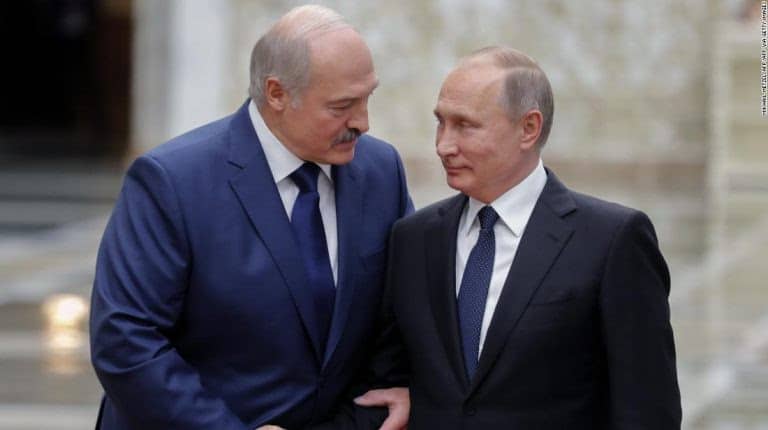It was a clear act of state-sponsored terrorism. An Irish passenger plane from the Irish budget airline Ryan Air, while on its way from Athens to Vilnius, was forced to land in the Belarusian capital Minsk on May 23 only minutes before it was due to leave Belarus’ airspace.
Flimsy claims by Belarusian air traffic controller that a bomb was on board quickly turned out to be a hoax cooked up by the dictatorial regime of the country’s long time leader Alexander Lukashenko. In reality, Lukashenko wanted Belarusian journalist and opposition activist Roman Protasevic (Raman Pratasevich in Belarusian), who was on board the flight, to be forcibly brought to Minsk.
The Belarusian dictator, who has held on to power using brutal methods to quash pro-democracy protests after a fraudulent election in August 2020, wanted to arrest one of his main opponents. After he was arrested, together with his Russian girlfriend Sofia Sapega, the 26-year-old reporter was forced to make a confession after being visibly tortured by the Belarusian KGB.

Roman Protasevich, seen here in the video released by Belarusian authorities several hours after being arrested when his Ryanair flight was redirected to Minsk in an act of state-sponsored hijacking. WIKIPEDIA
Protasevich has been in Lukashenko’s crosshairs due to his position as editor-in-chief of the popular Telegram channels Nexta and Nexta Live, both of which are based in neighboring Poland and have an audience of almost two million. They served as a channel for the large-scale anti-Lukashenko protests after last year’s rigged election gave Lukashenko, who has been in power since 1994, a sixth term in office.
Next and Nexta Live helped expose in real-time the scale of the secret police’s crackdown on the hundreds of thousands of Belarusians across the country. Lukashenko countered by saying he would “rather be killed” than hold fresh elections, and accused Protasevich of “terrorism”.
Protasevich had been in Athens to cover a visit by Svetlana Tikhanovskaya, Belarus’ leader-in-exile. Like many other Belarusian opposition members, Pratasevich had been forced into exile, in his case to Lithuania, he and his colleagues now face terrorism-related charges for exposing the Lukashenko regime’s corruption and abuse of power.
In the wake of the incident, the leaders of the EU and US immediately condemned Lukashenko and demanded the release of Pratasevich. The West is united against the regime in Minsk and have decided to levy new sanctions against the Lukashenko regime. Belarus’ national flag carrier Belavia has been banned from all flights to EU countries. All European airlines have also been ordered to fly around Belarus’ airspace to deprive Lukashenko of highly lucrative overflight fees. Other Belarusian politicians and entrepreneurs who remain loyal to Lukashenko have been banned from entering the European Union and further, potentially crippling, economic sanctions are most likely to follow soon. They will most likely target potash exports, which is one of the main revenue generators for Belarus.
The influential chairman of the British Parliament’s Foreign Affairs Committee, Tom Tugendhat, also urged the suspension of the controversial Nord Stream-II gas pipeline and the Yamal energy pipeline, both of which flow through Belarus and provide vast amounts of money that supports the “tyrannous (Lukashenko) regime”.
The heads of foreign affairs from eight countries – the Czech Republic, Germany, Ireland, Latvia, Lithuania, Poland, the UK and the US – have called for additional sanctions to be put in place against the Lukashenko regime, including the suspension of the country’s right to use Interpol and other international organizations.
Lukashenko has declared that he “will not remain silent and kneel down,” saying, “I have acted lawfully by protecting the people according to all international rules.” He has also announced that he will announce counter-sanctions against European countries; a response that he claims is justified.
The extent to which Moscow knew about or colluded with the hijacking of the Ryanair flight remains an open question. Experts, including the renowned American historian Timothy Snyder, believe that the Kremlin most likely gave their tacit approval of the hijacking.

Belarusian President Alexander Lukashenko (L) and his close ally Russian President Vladimir Putin (R).
Lukashenko, who for a while tried to free himself from Vladimir Putin’s influence and position himself as a mediator in the ongoing war in eastern Ukraine, now seems to have become a complete puppet of Putin. Only days after forcing the Ryanair jet to land in Minsk, he was in talks with Putin in Sochi to discuss the West’s reaction to his act of terrorism.
Moscow’s open pushback against the EU’s sanctions on Belarus is also striking. EU airlines, such as Austrian Airlines and Air France, which wanted to fly to Moscow via the new route past Belarus, were refused landing permission by Russian authorities.
Western diplomats have said they will be tough on Lukashenko. If that is the case, airlines like Turkish Airlines and Aeroflot, both of which continue to fly to Minsk, should be punished with a ban on flying to Europe.
The EU, the Council of Europe, the OSCE and international journalist organizations have unanimously condemned Protasevich’s arrest. The Association of European Journalists (AEJ) made several demands in a letter to Teresa Ribeiro the new media-freedom reprentative of the OSCE, of which Belarus is a member, to have Protasevich set free.
“We urge the Representative on Media Freedom, Mrs Ribeiro, to issue a full and robust statement without delay condemning the actions of the Belarus authorities over the unlawful detention and treatment of Roman Protasevich and Sofia Sapega; the denial of their legal rights and concerns about their mistreatment in custody; and demanding their immediate release and the Belarus authorities’ unconditional adherence to its OSCE obligations by ending their arbitrary and brutal suppression of the rights and safety of journalists and others and restoring the conditions for democracy and the rule of law.“
AEJ-General Secretary Edward Steen added in a statement: “Roman faces up to 15 years in prison, maybe worse. Is that a price he or any other journalists must pay for simply doing their jobs?” Given the worsening crackdown on media in Russia itself, and especially the silencing and imprisonment of Alexei Navalny, possible Russian secret service involvement in Belarus was “more than troubling”.
 UK PoliticsWorld PoliticsVideosPrivacy PolicyTerms And Conditions
UK PoliticsWorld PoliticsVideosPrivacy PolicyTerms And Conditions
